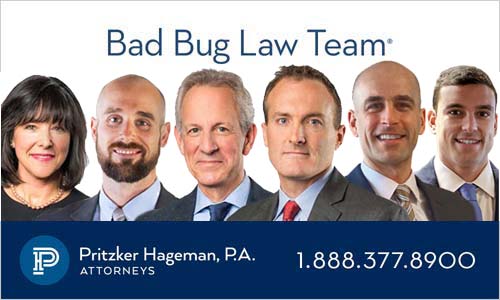Incubation periods for bacteria that cause food poisoning:
- Campylobacter jejune: 2-10 days, usually 2-5 days;
- Clostridium botulinum (botulism): 2 hrs-8 days, usually 12-48 hours;
- Clostridium perfringens: 6-24 hours;
- Escherichia coli (E. coli): 1-10 days, usually 3-4 days;
- Listeria monocytogenes: 2-10 weeks;
- Salmonella (most strains): 6 hrs-10 days, usually 6-48 hours;
- Salmonella Typhi: 3-60 days, usually 7-14 days;
- Shigella (shigellosis): 12 hrs-6 days, usually 2-4 days;
- Vibrio cholerae (cholera) (1-5 days), parahaemolyticus (4-30 hours) and vulnificus (1-7 days).

In foodborne illness (FBI) cases, it’s important to consider the time period from food ingestion to onset of symptoms (e.g. stomach cramps, diarrhea, vomiting, etc.). This is called the “incubation period.” This period begins to run from the time that you swallow a pathogen in food to the point at which you start feeling sick.
The incubation period varies greatly depending on which pathogen is making you sick. For example, the incubation period for a common source of FBI, Salmonella, can be as short as six hours or as long as 10 days, although the usual period is 6-48 hours. However, for another FBI pathogen, Listeria monocytogenes, the incubation period can be any time between two and six weeks or even longer, up to 70 days.
This is important to keep in mind when trying to figure out which food product is the likely source of your symptoms. For example, if a stool sample confirms that you were infected with Salmonella, it’s highly unlikely that the food product you ate 2 hours before your symptoms started was the cause of your illness.
Conversely, if no testing was done to identify the pathogen that caused your illness, it’s difficult, if not impossible, to know which incubation applies to your case. Without knowing the applicable incubation period, it’s difficult to know which food product caused your illness.
People often assume that the last thing they ate before they got sick is the cause of their illness. As you now know, that may not be correct.
If you know which pathogen caused your illness, check above to see what the incubation period is for that pathogen. This will help you identify which food product may have caused your illness.
If you haven’t been tested to identify the presence of a foodborne pathogen and you’re still symptomatic, it’s usually a good idea to consult with a doctor and ask to be tested.
What Should You Do if You Have a Food Poisoning Claim?
If you or your loved one has been diagnosed with food poisoning and know what pathogen caused the illness (see above), contact our law firm for a free consultation with Fred or another one of our food poisoning lawyers. You can use our free consultation form or call 1-888-377-8900 to find out if you can sue for food poisoning. We will help make sure of the following:
- all of the required tests have been done;
- an investigation is conducted to find the source of the illness and whether there is an outbreak (cluster of illnesses);
- all responsible companies are found and held responsible (restaurant, grocery store or other retailer, food processor, distributor, grower, etc.);
- you get the compensation you deserve.
